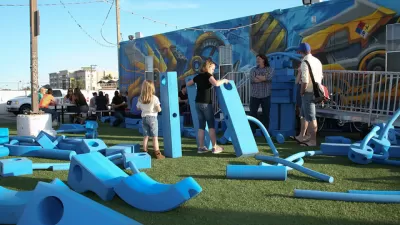Zappos, a shoe company, is working with Geoship, a geodesic dome company, to build a village of the domes in Las Vegas.

Adele Peters reports on the expanding project of a startup called Geoship, "which is using the material to build new dwellings in the form of a geodesic dome and has plans to produce both backyard cottages and full communities."
Geoship recently road a wave of news coverage when it partnered with shoe company Zappos, infamous in urbanism circles for its efforts to remodel Downtown Las Vegas in its own image, on a plan to build a village of geodesic domes in Las Vegas. Peters explains:
[Geoship] caught the attention of Zappos and is working with the company to build a small “village” of the domes in Las Vegas near the online shoe retailer headquarters. The plan is to offer them as free housing for some of the many people who are experiencing homelessness in the city.
A key feature of Geoship's business model is the bioceramic material used to build the domes:
The ceramic is fireproof up to 2,700 degrees Fahrenheit; in a fire, the house won’t burn. It reflects more than 80% of the heat from the sun, helping keep the inside cool in heat waves. The material is strong, and in combination with the inherent strength of the dome shape, should be able to survive hurricanes. It resists insects and mold. In a flood, it absorbs little water. In an earthquake, because of the building’s shape and the way that the panels chemically bond together, the house should stay standing.
All of those benefits and more are possible at 40 percent of the normal construction costs for a house of similar square footage, according to the company's claims.
Geoship is the latest company with connections to a big name to attempt disruption of the housing construction industry. Last week it was Kanye West.
FULL STORY: Are these fireproof, hurricane-proof geodesic domes the post-climate change house of the future?

Planetizen Federal Action Tracker
A weekly monitor of how Trump’s orders and actions are impacting planners and planning in America.

San Francisco's School District Spent $105M To Build Affordable Housing for Teachers — And That's Just the Beginning
SFUSD joins a growing list of school districts using their land holdings to address housing affordability challenges faced by their own employees.

The Tiny, Adorable $7,000 Car Turning Japan Onto EVs
The single seat Mibot charges from a regular plug as quickly as an iPad, and is about half the price of an average EV.

As Trump Phases Out FEMA, Is It Time to Flee the Floodplains?
With less federal funding available for disaster relief efforts, the need to relocate at-risk communities is more urgent than ever.

With Protected Lanes, 460% More People Commute by Bike
For those needing more ammo, more data proving what we already knew is here.

In More Metros Than You’d Think, Suburbs are Now More Expensive Than the City
If you're moving to the burbs to save on square footage, data shows you should think again.
Urban Design for Planners 1: Software Tools
This six-course series explores essential urban design concepts using open source software and equips planners with the tools they need to participate fully in the urban design process.
Planning for Universal Design
Learn the tools for implementing Universal Design in planning regulations.
Smith Gee Studio
City of Charlotte
City of Camden Redevelopment Agency
City of Astoria
Transportation Research & Education Center (TREC) at Portland State University
US High Speed Rail Association
City of Camden Redevelopment Agency
Municipality of Princeton (NJ)



























